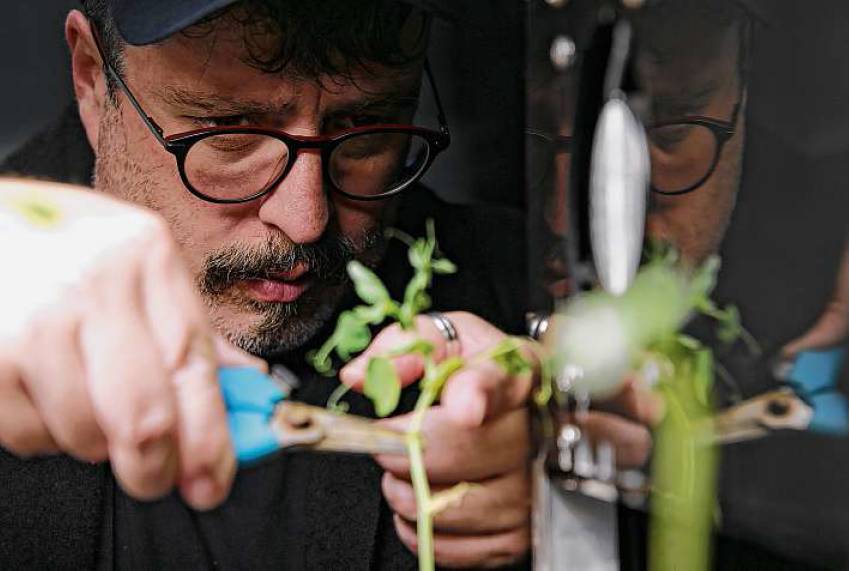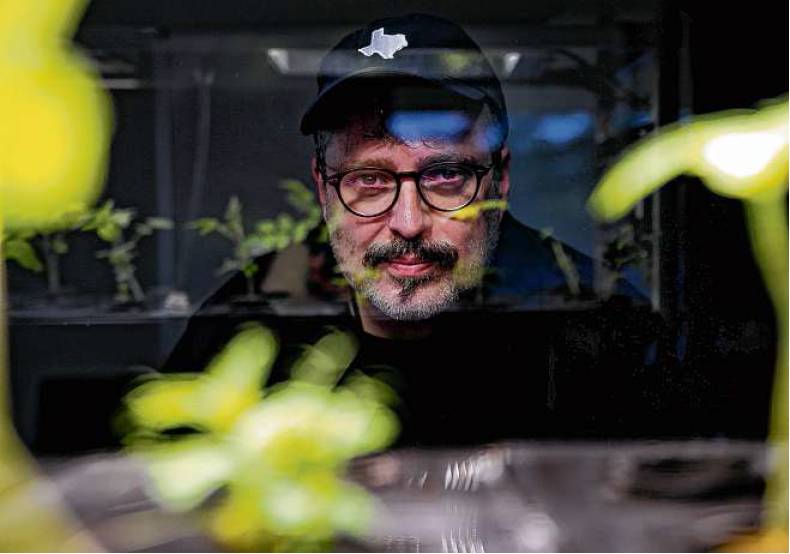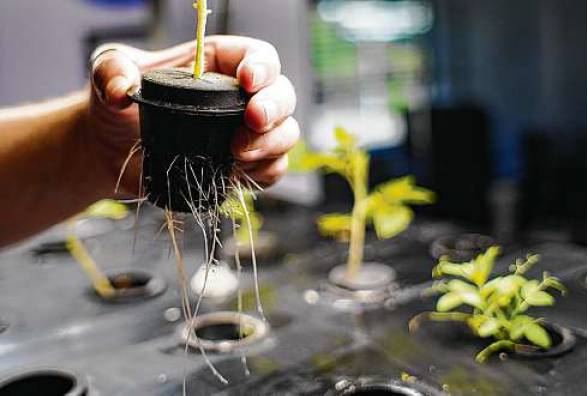SUSTAINABILITY
Food independence soon may grow from NASA tech
Houston company developing system for any environment
By Andrea Leinfelder STAFF WRITER
As disrupted global supply chains have made clear, reliable food sources are more important than ever. A remedy: grow systems powered by wind and sun that pull water out of the air and recycle their own waste and that of humans and fish.
A Houston company is selling precursors while it develops the full-blown systems.
“The idea was to make a system that you could literally drop on Mars, drop in the desert or drop in Antarctica and it would be able to generate its own resources,” said Bart Womack, CEO of Eden Grow Systems. “It’s a life-support system. You can even lock everyone inside of it, and it produces enough oxygen for them to breathe.”
It would allow a family of four to survive should a freeze or hurricane cause disruption.
The company is drawing on NASA’s food-growing technology and adapting it for extreme areas of Earth — as well as backyards and community organizations. Eden Grow Systems recently landed a Department of Defense contract to help the Air Force develop farming systems for its bases and has been selling aeroponics towers, including a recent sale to a church in Washington state.
Eden Grow Systems was incorporated in 2017, but the idea began in 2014 when Womack was researching investment trends for a family office (a private financial advisory firm for very wealthy individuals). He kept coming across articles explaining how the global food supply chain was just one hiccup away from a massive cascading disruption.
“I said to the family office, ‘You need to get into farming.’ And that’s when I realized I need to get into farming,” Womack said. “I couldn’t see COVID happening, but I knew by the very nature of the way things were being set up. I knew there was only an amount of time where ‘X’ would happen.”
Eden Grow Systems has raised $1.2 million from angel investors, family offices and venture capital firms. This month, it will open a 12,000-square-foot manufacturing facility in Tomball where it will build its products and use its systems to grow food that can be sold at local farmers markets.
Thus far, the 11-person company has sold roughly 35 of its aeroponics towers, a precursor to the systems that create their own power and water (those systems will be available as products within the next two years).
Each tower costs between $2,000 and $3,000 and can grow 32 to 96 plants, depending on if it has one, two or three decks. The towers — which look like big shelving units — are made of high-density poly ethylene and aluminum. Instead of using soil, the roots hang in a bag and are sprayed with a water-nutrients mixture that’s the density of fog.
“Drop it in any environment … and within four to six weeks it’s producing enough food for a family, or for four people, to live off indefinitely.”
Bart Womack, CEO of Eden Grow Systems
“The roots turn this white color, and the roots literally breathe this mist in,” Womack said. “When I say white, I mean like solid white. A beautiful, solid white color.”
These towers don’t yet produce their own water and power, but their efficiency is the first step toward that system. Plants in these towers require less water and nutrients than fruits and vegetables placed directly into soil.
The patent-pending Genesis System will be powered by the wind and sun, pull water out of the air and even recycle its own waste, meaning dead plants will be broken down into fertilizer that can provide nutrients to the living plants. Human waste can also be used to provide nutrients, and the system will have fish and shrimp that are fed organic, nutrient-dense food so their waste can provide nutrients to the plants, too.
“You can drop it in any environment, on or off world, and within four to six weeks it’s producing enough food for a family, or for four people, to live off indefinitely,” Womack said.
The Genesis System is still being developed but would cost a family of four $100,000. Womack expects that cost will come down as the company produces more of these systems.
The towers will similarly be retrofitted to become more self-sufficient, costing roughly $2,000 to $5,000 each. One tower wouldn’t feed a family of four indefinitely, but it would help supplement their food supply (and families can purchase more than one tower if they want).
To date, the tower customers have largely been split between community organizations and households wanting more control over their food supply. Some customers cited disruptions caused by COVID-19 for buying the towers.
One tower was purchased by Grace Baptist Church in White Salmon, Wash. A group of middle school and high school boys shoveled snow, painted a house and split wood to raise the money. They’re currently growing radishes, basil and lettuce inside their church.
The tower is teaching the boys about aeroponics — the process where the plant roots are misted rather than placed in soil — and the science behind growing their own food, such as keeping the pH balance correct.
Eventually, the church would like to buy additional towers and place them throughout the community, providing a mental, spiritual and nutritious boost to their neighbors. The towers could be particularly useful in assisted living facilities where older residents can no longer work in traditional gardens but might still enjoy growing food.
“Helping people to be emotionally, physically healthy is really what we’re trying to do,” said Scott Fies, who is on the church’s elder leadership team and is working with the boys to grow the food. “We’re really looking for long-term solutions for people’s spiritual health as well.”
Gary Stutte, Eden Grow Systems’ director of research and development, said these towers are filling a gap in the market. The towers are more robust than tabletop units used by hobbyists, and they are less expensive than commercial-grade units. The towers can be configured to meet a variety of different needs, whereas the full-fledged Genesis System will be more comparable to commercial-grade units.
Stutte in October joined Eden Grow Systems. He previously spent 25 years managing NASA’s plant research at the Kennedy Space Center in Florida, where he researched and developed food production systems for long-duration space missions to the moon, Mars and beyond.
Now his consulting company SyNRGE is helping bring that technology to Earth.
“If you can have individual control over your food system,” Stutte said, “that provides you some level of security and freedom.”
In January the firm should be listed on the private investing platform republic.co, where people will get Eden Grow Systems equity in exchange for providing funding.
And although Eden Grow Systems’ technology originated at NASA, Stutte feels the commercial sector will be able to adjust the technology and mass produce it for space. Companies tend to make products faster and for less money than the government.
And as people spend longer periods of time in space, food will be more than just a necessity. It’ll help provide quality of life.
“You can 3D-print bug paste and feed it to people, and it will be efficient,” Womack said. “But it’s not going to make people happy or give them a good quality of life.” andrea.leinfelder@chron.com twitter.com/a_leinfelder


